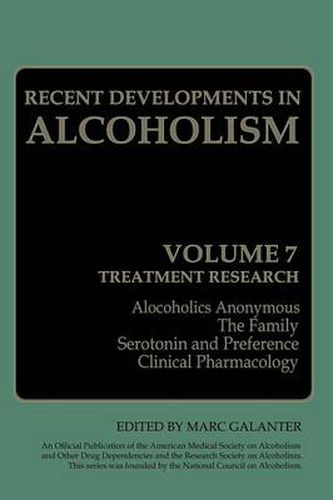Readings Newsletter
Become a Readings Member to make your shopping experience even easier.
Sign in or sign up for free!
You’re not far away from qualifying for FREE standard shipping within Australia
You’ve qualified for FREE standard shipping within Australia
The cart is loading…






This title is printed to order. This book may have been self-published. If so, we cannot guarantee the quality of the content. In the main most books will have gone through the editing process however some may not. We therefore suggest that you be aware of this before ordering this book. If in doubt check either the author or publisher’s details as we are unable to accept any returns unless they are faulty. Please contact us if you have any questions.
From the President of the Research Society on Alcoholism In the last decade research concerning the causes and consequences of alcohol abuse and alcoholism has come of age. We have witnessed a plethora of sci entific findings that have shed light on some of the actions of alcohol at the molecular level. Interesting new data have been forthcoming on the complexi ties of the development of tolerance to alcohol. It is becoming increasingly appropriate to consider that tolerance to alcohol involves biological as well as psychological factors. New scientific insights have been gained concerning the treatment of with drawal as well as the presence of persistent withdrawal signs that may possibly be involved with relapse. More recently, new and compelling data indicating that alcoholism is a common familial disorder have appeared. Clinical studies indicate that alcoholism is a heterogeneous disorder with multiformity in clin ical symptomatology and genetic heterogeneity. The heterogeneity of the clin ical features and the heritability of the predisposing factors of alcoholism are currently under vigorous scientific investigation. In the past several years sophisticated psychosocial studies have provided fundamental information on subjects at high risk for alcoholism. Psychosocial and biological studies of families including alcoholics and subjects at high risk are likely to bring new insights to our understanding of etiological factors. Moreover, as a result of these studies we stand to develop better prevention initiatives and treatment approaches.
$9.00 standard shipping within Australia
FREE standard shipping within Australia for orders over $100.00
Express & International shipping calculated at checkout
This title is printed to order. This book may have been self-published. If so, we cannot guarantee the quality of the content. In the main most books will have gone through the editing process however some may not. We therefore suggest that you be aware of this before ordering this book. If in doubt check either the author or publisher’s details as we are unable to accept any returns unless they are faulty. Please contact us if you have any questions.
From the President of the Research Society on Alcoholism In the last decade research concerning the causes and consequences of alcohol abuse and alcoholism has come of age. We have witnessed a plethora of sci entific findings that have shed light on some of the actions of alcohol at the molecular level. Interesting new data have been forthcoming on the complexi ties of the development of tolerance to alcohol. It is becoming increasingly appropriate to consider that tolerance to alcohol involves biological as well as psychological factors. New scientific insights have been gained concerning the treatment of with drawal as well as the presence of persistent withdrawal signs that may possibly be involved with relapse. More recently, new and compelling data indicating that alcoholism is a common familial disorder have appeared. Clinical studies indicate that alcoholism is a heterogeneous disorder with multiformity in clin ical symptomatology and genetic heterogeneity. The heterogeneity of the clin ical features and the heritability of the predisposing factors of alcoholism are currently under vigorous scientific investigation. In the past several years sophisticated psychosocial studies have provided fundamental information on subjects at high risk for alcoholism. Psychosocial and biological studies of families including alcoholics and subjects at high risk are likely to bring new insights to our understanding of etiological factors. Moreover, as a result of these studies we stand to develop better prevention initiatives and treatment approaches.